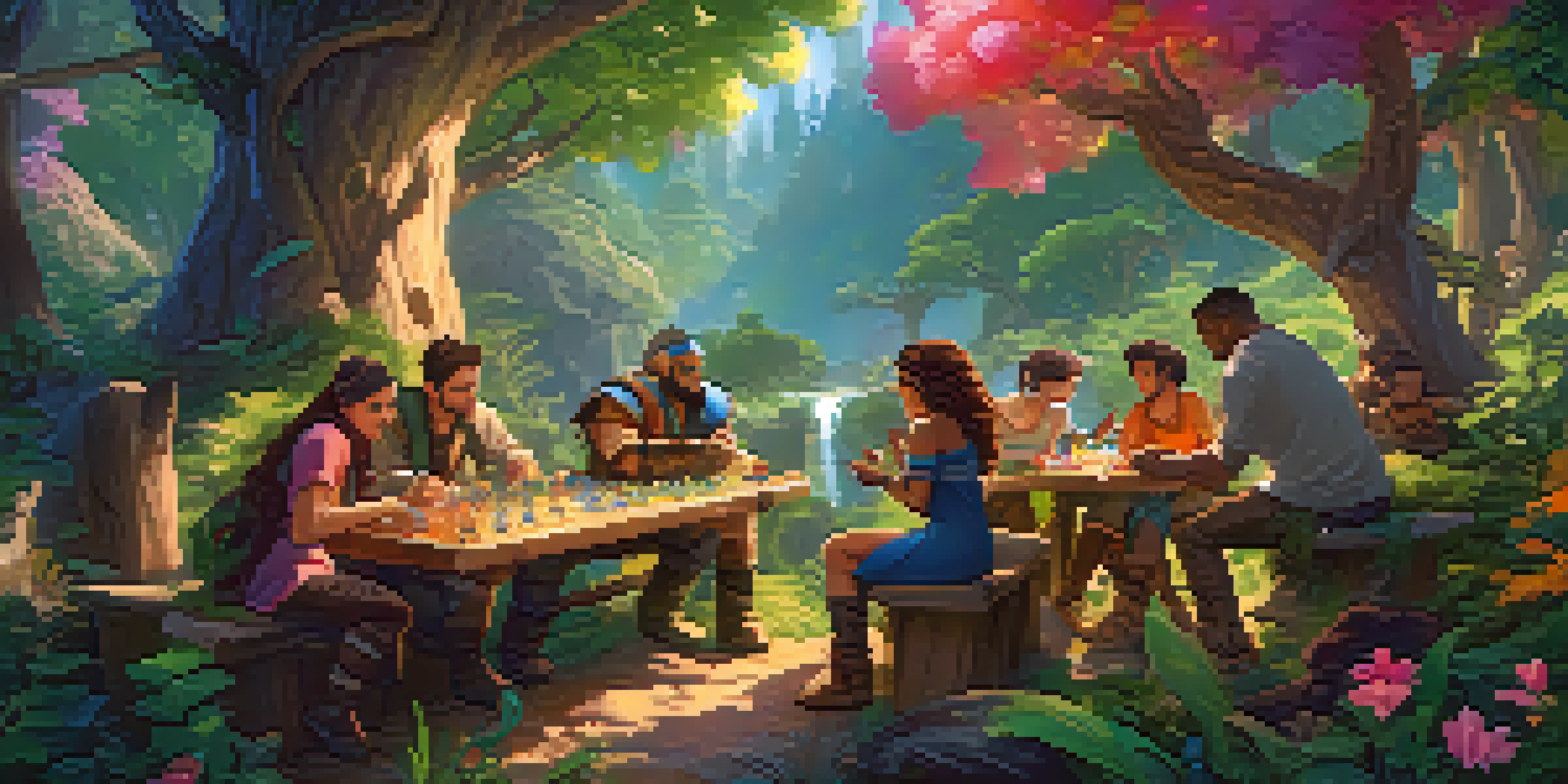Gaming and Digital Citizenship: Responsible Player Behavior

Understanding Digital Citizenship in Gaming Communities
Digital citizenship refers to the responsible use of technology and the internet. In gaming, this means engaging with others respectfully and ethically. Just like in real life, how you interact with fellow players can shape the community and your gaming experience.
In gaming, as in life, how we treat others shapes our community and defines our experience.
Being a good digital citizen in gaming involves understanding the impact of your actions. For instance, toxic behavior like harassment can lead to a negative atmosphere, driving players away. Conversely, positive interactions can foster a welcoming environment where everyone feels included and valued.
As gaming continues to grow, understanding digital citizenship becomes crucial. Players are not just participants; they're part of a larger community that thrives on mutual respect and cooperation. This sets the stage for a more enjoyable gaming experience for all.
The Role of Empathy in Gaming Interactions
Empathy is the ability to understand and share the feelings of others. In gaming, this means recognizing that behind every avatar is a real person with emotions. When players take a moment to consider how their words and actions affect others, it can drastically improve interactions.

Consider a scenario where a player makes a mistake in-game, leading to a loss. Instead of lashing out, showing empathy by offering constructive feedback can help them learn and improve. This not only fosters a sense of community but also encourages players to support one another.
Embrace Digital Citizenship in Gaming
Engaging respectfully and ethically in gaming communities fosters a positive environment for all players.
Ultimately, embracing empathy in gaming contributes to a culture of kindness. By prioritizing understanding and compassion, players can create a more enjoyable experience for everyone involved.
Consequences of Toxic Behavior in Online Gaming
Toxic behavior, such as bullying or harassment, can have significant consequences for both players and the gaming community. It can lead to bans, account suspensions, and even loss of access to games. More importantly, it creates a hostile environment that can discourage new players from joining.
Empathy is about standing in someone else's shoes, especially in the virtual worlds we create.
Imagine a newcomer excited to dive into a multiplayer game, only to face ridicule from seasoned players. This experience can tarnish their enthusiasm and make them reluctant to engage with others in the future. Over time, toxic behavior can lead to a shrinking community and diminished enjoyment for everyone.
Recognizing the impact of toxic behavior is essential for fostering a positive gaming culture. By holding ourselves accountable and promoting respectful interactions, we can help ensure that gaming remains a fun and welcoming space for everyone.
Promoting Positive Communication in Gaming
Effective communication is key to a successful gaming experience. Players need to express themselves clearly and respectfully, whether coordinating strategies or discussing game mechanics. Positive communication can enhance teamwork and lead to better overall performance in games.
One way to promote positive communication is by using constructive language. Instead of saying, 'You messed up,' consider saying, 'Let's try this approach next time.' This small shift can make a huge difference in how messages are received and can motivate players to improve.
Promote Empathy Among Players
Recognizing that other players have feelings can significantly enhance interactions and build community.
Creating an atmosphere where players feel safe to communicate openly also fosters collaboration. When everyone feels respected, it encourages more players to share their ideas, which can enhance the gaming experience for all involved.
Understanding and Reporting Inappropriate Behavior
In online gaming, players may encounter inappropriate behavior that disrupts the experience. Knowing how to recognize and report such actions is vital for maintaining a healthy community. Whether it’s harassment, cheating, or hate speech, taking action can help protect others.
Most gaming platforms have built-in reporting features that allow players to flag inappropriate conduct. By utilizing these tools, players can contribute to a safer gaming environment. Remember, reporting is not just about addressing bad behavior; it’s about standing up for what’s right.
Ultimately, being proactive about reporting inappropriate behavior can lead to a more enjoyable gaming landscape. It sends a message that the community values respect and accountability, encouraging everyone to do their part in upholding these standards.
The Importance of Setting Personal Boundaries
Setting personal boundaries in gaming is essential for maintaining a healthy balance between play and real life. It's easy to get swept up in the excitement of a game, but players must recognize when it's time to step back. Establishing limits can prevent burnout and keep gaming enjoyable.
For example, a player might decide to limit their gaming sessions to two hours a day. This allows them to engage with their hobbies without sacrificing other important aspects of life, such as socializing or exercise. Healthy boundaries ensure that gaming remains a source of fun rather than stress.
Encourage Inclusivity in Gaming
Creating a welcoming space for diverse players enriches the gaming experience and strengthens community bonds.
By prioritizing personal boundaries, players set a positive example for others. It encourages a culture where gaming is enjoyed responsibly, allowing everyone to benefit from the experience without it taking over their lives.
Encouraging Inclusivity in Gaming Communities
Inclusivity is about creating a gaming environment where everyone feels welcome, regardless of background or skill level. Encouraging inclusivity means recognizing and valuing diversity within the gaming community. This can lead to richer experiences and a broader range of perspectives.
One way to promote inclusivity is by engaging in games that celebrate different cultures and experiences. Multiplayer games that allow for diverse character creation and narratives can help players appreciate varying viewpoints. This not only enriches gameplay but also fosters understanding among players.

Emphasizing inclusivity helps build stronger gaming communities. When players feel valued and respected, they are more likely to participate actively and contribute positively, creating a vibrant space for everyone.
Becoming a Responsible Player: Tips for Success
Becoming a responsible player involves being mindful of how your actions affect others. Simple practices like using respectful language, being supportive, and recognizing personal limits can go a long way in crafting a positive gaming environment. It’s about being aware of your impact on the community.
Another tip is to engage with resources that promote responsible gaming behavior. Many organizations and gaming platforms provide guidelines and tools for players to understand their rights and responsibilities. Familiarizing yourself with these resources can enhance your gaming experience.
Ultimately, being a responsible player is about more than just following rules; it's about creating a community where everyone can thrive. By applying these tips, players can contribute to a gaming culture that is enjoyable, respectful, and inclusive.